Just what exactly is Labour going to do for working people?
COMMENT: Could scrapping the May Day bank holiday be on the cards if Labour does win the coming general election?
Thursday, 2nd May

Sir Keir Starmer
IN his most recent election broadcast, a fortnight ago, Sir Keir Starmer spoke about putting the Labour Party back into the service of working people.
He often speaks about his working-class upbringing and how it shaped his vision for the country.
And yet this week concerns about what will be in Labour’s “New Deal for Working People” manifesto pledge were circulating in political circles.
National news desks have been briefed about watered-down reforms. The proposed ban on “zero hour” contracts is not set in stone in the employment rights bill, set to be introduced in the first 100 days after entering office.
Shadow ministers are said to be keen to ease the misgivings of business leaders in the City. But union leaders say they are still convinced the Labour government could not possibly go back on promises made to them at conference this week.
Time will tell what this Labour government in waiting manages to make a difference to the lives of “working people”.
That phrase “working people” is loaded; often used as a kind of shorthand for “as opposed to benefit scroungers”.
But the May Day march yesterday is a reminder of its true connotations of collective strength, unity and the importance of maintaining a strong and functioning union movement.
The celebrations are part of a proud radical history stretching back in this country to the turn of the 19th century.
Despite the horrors of war, the cost of living crisis and a climate emergency, there is hope in remembering successive generations who have fought for it to be celebrated in years gone by.
The May Day bank holiday – a welcome day off for millions of people – was introduced in the death throes of the Labour government in late 1978.
It was hoped the holiday might be a boost to the party’s chances following a resurgent Conservative Party led by Margaret Thatcher.
There have since then been successive attempts by the Conservatives to axe the May Day bank holiday – including a narrow defeat in the House of Commons in 1982, shortly after the end of the Falklands War.
In February 2011, an initially bullish Prime Minister David Cameron tried and failed to scrap the holiday, proposing a replacement in October called “United Kingdom Day”.
So far Labour appears to be maintaining its lead in the polls by out-Conservativing the Conservatives.
Starmer spoke last year about “changing our entire culture – our DNA – this is Clause Four on steroids…”
Could scrapping the May Day bank holiday be on the cards if Labour does win the coming general election? It feels like anything is possible.